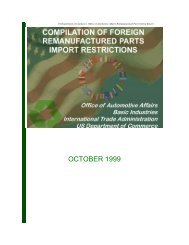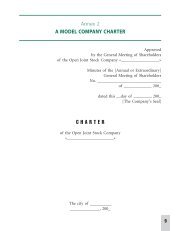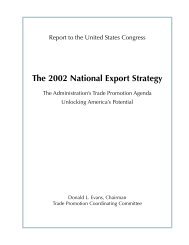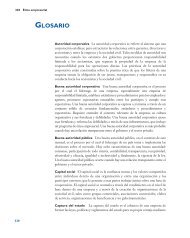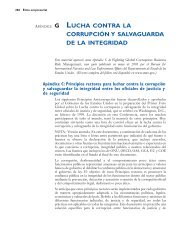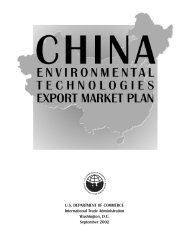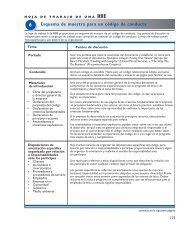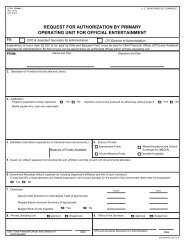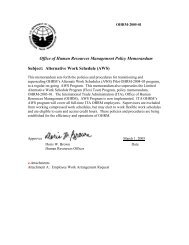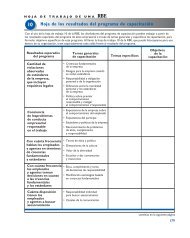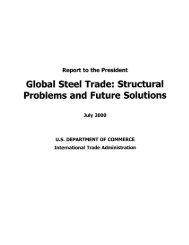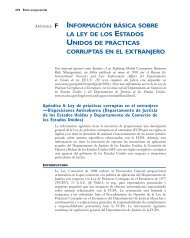Vietnam Environmental Technologies Export Market Plan
Vietnam Environmental Technologies Export Market Plan
Vietnam Environmental Technologies Export Market Plan
Create successful ePaper yourself
Turn your PDF publications into a flip-book with our unique Google optimized e-Paper software.
Chapter 14<br />
<strong>Market</strong> Entry Strategies<br />
14.1—Getting Started<br />
It is highly recommended that companies build a local<br />
presence in <strong>Vietnam</strong> by establishing a representative<br />
office to understand the dynamics of the market.<br />
Successful business in <strong>Vietnam</strong> means establishing<br />
relationships with key industry leaders and government<br />
officials and this can be accomplished locally. A foreign<br />
company with a representative office is allowed to<br />
negotiate and sign contracts with local firms or apply for<br />
an investment license from the government. However, a<br />
representative office cannot conduct commercial<br />
activities and earn revenue. Its sole purpose is to allow a<br />
company to research and prepare for a more formal<br />
investment project. The Ministry of Trade issues<br />
representative office licenses that are usually valid for<br />
five years. The current fee is just 1 million dong<br />
(approximately $71).<br />
14.2—ODA-Funded Projects<br />
In the foreseeable future, the best opportunities for<br />
environmental equipment and services will be projects<br />
financed with overseas development assistance (ODA).<br />
Therefore, it is essential to maintain contact with ODA<br />
sources to remain abreast of project opportunities and<br />
status.<br />
Tracking ODA projects includes establishing relationships<br />
with implementing ministries, agencies, and offices<br />
that will be responsible for project management on a local<br />
level. Successful bidding on ODA projects depends upon<br />
meeting the detailed qualifications set out in bidding<br />
documents and establishing relationships with key local<br />
decision makers.<br />
ODA projects funded by the World Bank and the Asian<br />
Development Bank usually require that foreign contractors<br />
partner with local companies to promote transfer of<br />
technology/expertise. For example, in the case of large<br />
water supply, sewerage, and drainage projects, foreign<br />
companies often try to partner with the <strong>Vietnam</strong><br />
Consultancy for Water Supply, Sanitation and Environ-<br />
ment (VIWASE). VIWASE is owned by the Ministry of<br />
Construction.<br />
14.3—Imports<br />
All imported equipment must be through a company<br />
with an import/export license. Every shipment of goods<br />
must have an import permit from the Ministry of Trade.<br />
In general, government authorities frown upon imports<br />
of used or outdated equipment, even when such<br />
equipment may be more appropriate for <strong>Vietnam</strong>’s low<br />
level of infrastructure development.<br />
Industrial water pumps, water filters, liquid filters, and<br />
air or gas purifying machinery is exempt from import<br />
duties. Equipment imported for use at a foreign-invested<br />
company and in ODA projects may also be imported duty<br />
free. However, local customs officials are occasionally<br />
unaware of national import policies. In the past, imports<br />
of equipment for ODA projects have been delayed until<br />
these policies could be clarified for local officials.<br />
Household pumps and filters are subject to a 20 percent<br />
import tax. Import duties change often, especially since<br />
the introduction of the value added tax in <strong>Vietnam</strong> in<br />
January 1999, so rates should be checked before contracts<br />
are signed.<br />
<strong>Vietnam</strong> tends to grant import licenses only to large,<br />
state-owned firms. If one is distributing product via a<br />
smaller local agent that does not have import rights, this<br />
company then signs an import contract with the firm that<br />
owns an import license. The larger trader then earns a<br />
commission, ranging from 1 to 2 percent of the contract<br />
value.<br />
14.4—Distribution<br />
<strong>Vietnam</strong> does not grant distribution rights to foreign<br />
companies. They are only allowed to manage distribution<br />
legally if they enter into a joint manufacturing venture<br />
with a local firm.<br />
<strong>Vietnam</strong> <strong>Export</strong> <strong>Market</strong> <strong>Plan</strong><br />
51



